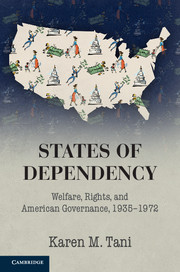Book contents
- Frontmatter
- Dedication
- Contents
- List of figures and tables
- List of gallery images
- Acknowledgments
- Introduction
- PART I 1935 TO 1949
- 1 A New Deal for Poor Relief? The Modern American State and the Endurance of the Local
- 2 Rights as an Administrative Tool: An Appeal to State and Local Bureaucrats
- 3 Rights as a “Live, Motivating Principle”: The Path toward Legalism
- 4 Claiming Welfare Rights: Fair Hearings, State-Court Claims, and a Forgotten Federal Case
- PART II 1950 TO 1972
- Conclusion
- Notes
- Selected Bibliography of Primary Sources
- Index
- Plate section
2 - Rights as an Administrative Tool: An Appeal to State and Local Bureaucrats
from PART I - 1935 TO 1949
Published online by Cambridge University Press: 05 April 2016
- Frontmatter
- Dedication
- Contents
- List of figures and tables
- List of gallery images
- Acknowledgments
- Introduction
- PART I 1935 TO 1949
- 1 A New Deal for Poor Relief? The Modern American State and the Endurance of the Local
- 2 Rights as an Administrative Tool: An Appeal to State and Local Bureaucrats
- 3 Rights as a “Live, Motivating Principle”: The Path toward Legalism
- 4 Claiming Welfare Rights: Fair Hearings, State-Court Claims, and a Forgotten Federal Case
- PART II 1950 TO 1972
- Conclusion
- Notes
- Selected Bibliography of Primary Sources
- Index
- Plate section
Summary
On March 12, 1939, W. B. Hayes wrote a letter to Indiana congressman George Gillie. The letter began with personal touches, meant to signal Hayes's standing and trustworthiness: Hayes recalled a time when the two men had met at the Shrine Temple in Fort Wayne, and noted his own government service as a local postmaster in Garrett. Then on to business: Hayes's mother-in-law, Lulu Brown, had recently applied for Old Age Assistance in DeKalb County and had been rejected, on account of the fact that she now lived periodically with her adult children in neighboring states (Hayes himself resided in Beulah, Michigan). Yet DeKalb County had been her home from 1900 until her husband died in 1937, Hayes explained; she would live there still were it not for her poor health and utter destitution. Invoking the well-established image of the despised foreign pauper – which surely Mrs. Brown was above – Hayes urged Gillie to ensure that she not be treated “as an alien.”
It was a letter from a disappearing era, when patronage politics and community reputation played a decisive role in who received aid. The reply, three days later, suggested the broad changes afoot: Congressman Gillie reported that he had consulted with no less than the assistant general counsel of the federal Social Security Board and learned that public assistance was Mrs. Brown's legal right. As a technical matter, residence was mostly a matter of intent, the federal lawyer had explained to Gillie, so Mrs. Brown's travels outside the state did not disqualify her from receiving benefits; she was “entitled” to assistance from Indiana. For Mrs. Brown, in other words, poor relief was no longer a matter of discretion, dependent on community understandings of deservingness and conditioned on rigid adherence to community norms. It was her right. Gillie urged Hayes to pass this message directly to the county authorities and to appeal to Indiana's state welfare agency (a process to which Mrs. Brown was also now entitled) if they did not come around.
Whether Lulu Brown ultimately received the aid she sought, these records do not say, but they do reveal an even more important phenomenon. From the Social Security Board down to the residents of DeKalb County, a new concept was circulating: for large groups of Americans, government assistance was the legal right of all those who met basic eligibility requirements.
- Type
- Chapter
- Information
- States of DependencyWelfare, Rights, and American Governance, 1935–1972, pp. 57 - 80Publisher: Cambridge University PressPrint publication year: 2016



